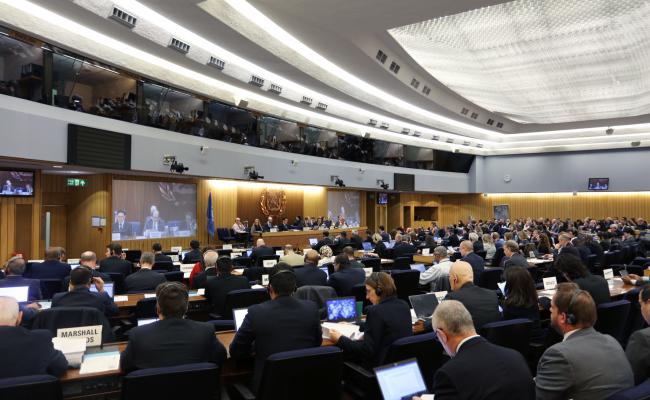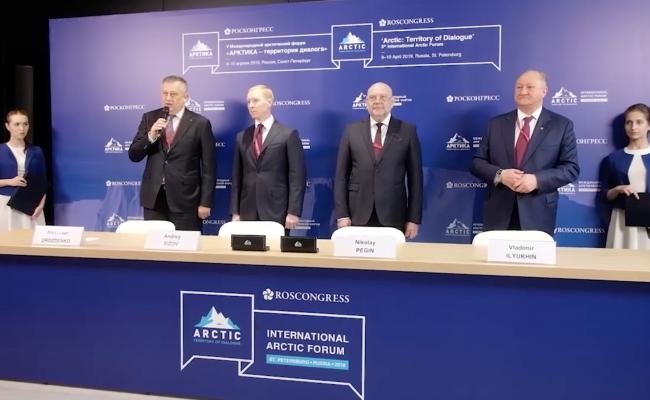Research Millions to Maritime Research in the Arctic
“This cements CHNL’s position significantly and we congratulate the center”, says Dean Erlend Bullvåg at Nord University School of Business. Here pictured with Manager Kjell Stokvik (left) of the Centre for High North Logistics at Arctic Circle 2019. (Photo: Trine Jonassen)
The Centre for High North Logistics in Kirkenes, Norway has been granted more than NOK 7 million. The project funds are to be spent on research and development of Arctic maritime logistics and transport solutions in the Barents region.
National borders cross through infrastructure in Arctic transport systems at sea. The limited opportunities for cross-border transport affects preconditions for economic growth. The project will explore solutions creating cost and eco efficiency in collaboration with the business sector.
A joint cross-border competence community will also be established in Kirkenes.
“This is an important day for cooperation with Russia. We can now cooperate about developing sustainable transport solutions for the Barents region”, Manager Kjell Stokvik of the Centre for High North Logistics says in a press statement.
The project is about efficient logistics solutions, transport safety and reduction of negative environmental impact. A proposed framework for Arctic logistic hubs will be developed, amongst others.
Thus, the whole research project may benefit actors and negotiators in the industry. In addition, the findings from the project will provide reliable input for the Norwegian National Transport Plan as well as for the Joint Barents Transport Plan.
We can now cooperate about developing sustainable transport solutions for the Barents region
New insight important
“Projects like this demonstrate the solid and active cross-border knowledge cooperation existing in the High North and demonstrate the diversity of Barents cooperation. New insight is always important, and we wish the researchers all the best for this work”, says State Secretary of the Ministry of Foreign Affairs Marte Ziolkowski.
In relation to the Norwegian chairmanship period, the Norwegian Research Council announced grants for research cooperation in health, welfare and business development in the Barents region. These funds were made available from the MFA’s knowledge initiative related to Norway’s chairmanship period of the Barents Council.
“This is an important initiative for the government. The strength of the Barents cooperation is that it is about contact between people in the North. Through our chairmanship priorities of health, people-to-people and knowledge, we want to support what is important for securing strong communities in the Barents region”, says Ziolkowski.
Propose improvements
Current maritime transport and logistics connections in the Barents region will be evaluated and analyzed. Then, methods for increasing the sea transport share of the total cargo flow will be assessed in light of costs and environment emissions. This research will provide well-considered proposals for future logistic opportunities in the Barents region.
Further goals for the project are fourfold. The significance of northern peripheries as transport hubs will be analyzed, and there will also be an analysis of how much cargo one expects to be generated along the Northern Sea Route over the next ten years.
Also read
The project is also to assess the operational, technical, and structural components in the maritime logistics system and propose changes based on new concept and models.
Reduce emissions
Another partial goal is to identify environmental risks related to increased shipping in the Barents region and subsequently to provide specific proposals as to how to reduce such emissions.
Eight specific work packages are implicitly described in the targets. The extent of the project thus provides great opportunities for significant findings and results.
“This cements CHNL’s position significantly and we congratulate the center. The project is important for our business school’s cooperation with enterprise and will contribute to reinforcing our 30-year long cooperation with our Russian partners”, says Dean Erlend Bullvåg at Nord University School of Business.
Project Facts
The project grant of NOK 7.5 million is a part of the program for the Norwegian Barents Council chairmanship period, which is chaired by the Ministry of Foreign Affairs and allocated via the Norwegian Research Council.
The project partners are the Northern Arctic Federal University NArFU), Murmansk State Technical University, Sør-Varanger Utvikling, Tschudi Kirkenes and Akvaplan Niva.
This article was originally published in Norwegian and has been translated by HNN's Elisabeth Bergquist.




